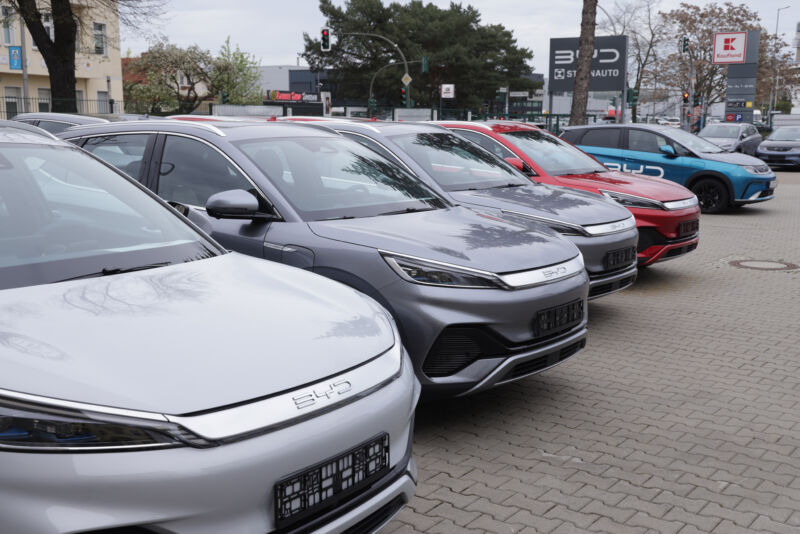
Sean Gallup/Getty Images
Influential US Senator Sherrod Brown (D–Ohio) has called on US President Joe Biden to ban electric vehicles from Chinese brands. Brown calls Chinese EVs “an existential threat” to the US automotive industry and says that allowing imports of cheap EVs from Chinese brands “is inconsistent with a pro-worker industrial policy.”
Brown’s letter to the president is the most recent to sound alarms about the threat of heavily subsidized Chinese EVs moving into established markets. Brands like BYD and MG have been on sale in the European Union for some years now, and last October, the EU launched an anti-subsidy investigation into whether the Chinese government is giving Chinese brands an unfair advantage.
The EU probe won’t wrap until November, but another report published this week found that government subsidies for green technology companies are prevalent in China. BYD, which now sells more EVs than Tesla, has benefited from almost $4 billion (€3.7 billion) in direct help from the Chinese government in 2022, according to a study by the Kiel Institute.
Last month, the EU even started paying extra attention to imports of Chinese EVs, issuing a threat of retroactive tariffs that could start being imposed this summer.
Chinese EV imports to the EU have increased by 14 percent since the start of its investigation, but they have yet to really begin in the US, where there are a few barriers in their way. Chinese batteries make an EV ineligible for the IRS’s clean vehicle tax credit, for one thing. And Chinese-made vehicles (like the Lincoln Nautilus, Buick Envision, and Polestar 2) are already subject to a 27.5 percent import tax.
An existential threat?
But Chinese EVs are on sale in Mexico already, and that has American automakers worried. Last year, Ford CEO Jim Farley said he saw Chinese automakers “as the main competitors, not GM or Toyota.” And in January, Tesla CEO Elon Musk said he believed that “if there are no trade barriers established, they will pretty much demolish most other car companies in the world.”
BYD, which recently debuted a sub-$10,000 EV called the Seagull, is reportedly looking for a factory in Mexico. That would allow it to build cars for the US market that aren’t subject to the 27.5 percent tax.
But not if Congress gets its way. A few weeks ago, Joshua Hawley (D-Mo.)—using very similar language to Brown—called for a tax increase on Chinese EVs. Hawley wanted to raise the base tariff from 2.5 percent to 100 percent, which would result in Chinese EVs being subject to an overall 125 percent import tax, up from today’s 27.5 percent. Hawley also wanted to apply those rates to Chinese EVs assembled in Mexico.
“A surge in Chinese EV sales would cripple the domestic manufacturing base, including critical inputs from parts suppliers to steel, tires, and glass producers,” wrote Brown, noting also that Chinese EVs could “undermine efforts to reshore semiconductor production.” Brown is similarly down on allowing made-in-Mexico EVs from Chinese brands.
It’s not just the potential damage to the US auto industry that has prompted this letter. Brown wrote that he is concerned about the risk of China having access to data collected by connected cars, “whether it be information about traffic patterns, critical infrastructure, or the lives of Americans,” pointing out that “China does not allow American-made electric vehicles near their official buildings.”
At the end of February, the Commerce Department also warned of the security risk from Chinese-connected cars and revealed it has launched an investigation into the matter.
Brown doesn’t just want a tariff on Chinese EVs, though. “When the goal is to dominate a sector, tariffs are insufficient to stop their attack on American manufacturing,” Brown wrote. “Instead, the Administration should act now to ban Chinese EVs before they destroy the potential for the US EV market. For this reason, no solution should be left off the table, including the use of Section 421 (China Safeguard) of the Trade Act of 19745, or some other authority.”




















+ There are no comments
Add yours